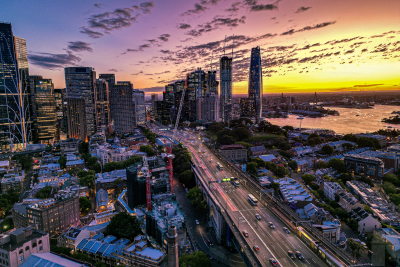As we approach the final quarter of 2024, the Sydney office leasing market continues to evolve, reflecting broader economic trends, shifting workplace dynamics and the ongoing impact of technological advancements. At MMJ Real Estate, we've been closely monitoring these developments, and I'd like to share some key insights and trends shaping the market.
Market Overview: A Tale of Two Cities
The first half of 2024 has been characterised by a split in the Sydney office market. On one hand, prime-grade office spaces in Sydney's CBD have continued to perform strongly, driven by demand from blue-chip companies and financial services firms. On the other hand, secondary-grade office spaces, particularly in fringe locations, have faced challenges with rising vacancy rates and downward pressure on gross effective rents.
According to CoreLogic, the vacancy rate for prime office spaces in Sydney's CBD remains low at around 6.5%, supported by strong leasing activity and limited new supply. However, secondary-grade office spaces have seen vacancy rates climb to over 12%, reflecting a preference among tenants for higher-quality work environments.
Leasing incentives remain high averaging 36%. Whilst such incentives vary across properties and is impacted by individual landlords, locations, asset grades and agreed term lengths, there remains great opportunities for tenants to capitalise by relocating to higher grade assets and prime locations.
Trends Shaping the Market
- Flight to Quality: The trend of tenants upgrading to higher-quality office spaces has persisted throughout the first half of the year. Companies are increasingly prioritising premium office environments that offer enhanced amenities, sustainability credentials, and flexible layouts to attract and retain talent. This "flight to quality" is evident in the strong performance of A-grade buildings, where leasing activity has remained robust.
- Flexible Workspaces: The rise of hybrid working models has continued to influence leasing decisions. Many companies are opting for flexible office spaces that can adapt to changing workforce needs. This has led to increased demand for coworking spaces and serviced offices, particularly in prime locations with excellent transport links.
- Sustainability and ESG: Environmental, Social, and Governance (ESG) considerations are playing a more significant role in leasing decisions. Tenants (notable blue chip) are increasingly seeking office spaces with strong sustainability credentials, including energy-efficient buildings and spaces that promote employee well-being. This trend is likely to accelerate as companies strive to meet their ESG commitments. Notably areas such as Barnagroo, Australia’s first large-scale carbon-neutral community and office assets such as International Towers are providing Prime sustainable assets to meet this demand. Rental growth and demand is set to increase in this area with the opening of the new Metro line providing greater connectivity though greater Sydney.
- Tech-Driven Demand: The tech sector remains a key driver of demand in the Sydney office market. Companies in fintech, software development, and digital marketing continue to expand, fuelling demand for office spaces that support collaboration and innovation. Sydney's status as a tech hub is helping to sustain demand for well-located office spaces.

Market Statistics and Highlights
- Rental Growth: According to data from RealCommercial.com.au, rental growth for prime office spaces in Sydney's CBD has remained steady, with average gross face rents increasing by 2.8% in the first half of 2024. In contrast, rents for secondary office spaces have seen little to no growth, with some areas experiencing a slight decline.
- Leasing Activity: CommercialRealEstate.com.au reports that leasing activity in Sydney's CBD has been strong, with several large leases signed by major financial institutions and tech firms. Notable deals include a 10,000 sqm lease by a leading fintech company in Barangaroo and a 7,500 sqm lease by a global consultancy firm in Martin Place.
- Supply Pipeline: The supply of new office spaces remains limited, with only a few significant developments set to be completed in the next 12 months. This constrained supply is likely to support rental growth in prime locations, while secondary markets may face further challenges.
Looking Ahead
As we move into the final quarter of 2024, the Sydney office leasing market is expected to remain dynamic, with ongoing demand for high-quality, flexible and sustainable office spaces. While challenges persist in the secondary market, particularly in fringe locations, the overall outlook remains positive for prime-grade office spaces in the CBD.
At MMJ Real Estate, we're committed to helping our clients navigate this evolving landscape, leveraging our deep market knowledge and expertise to secure the best outcomes. Whether you're looking to lease, invest, or simply stay informed, our team is here to support you every step of the way.
For a personal and confidential discussion about your commercial property in Sydney reach out to our team.

